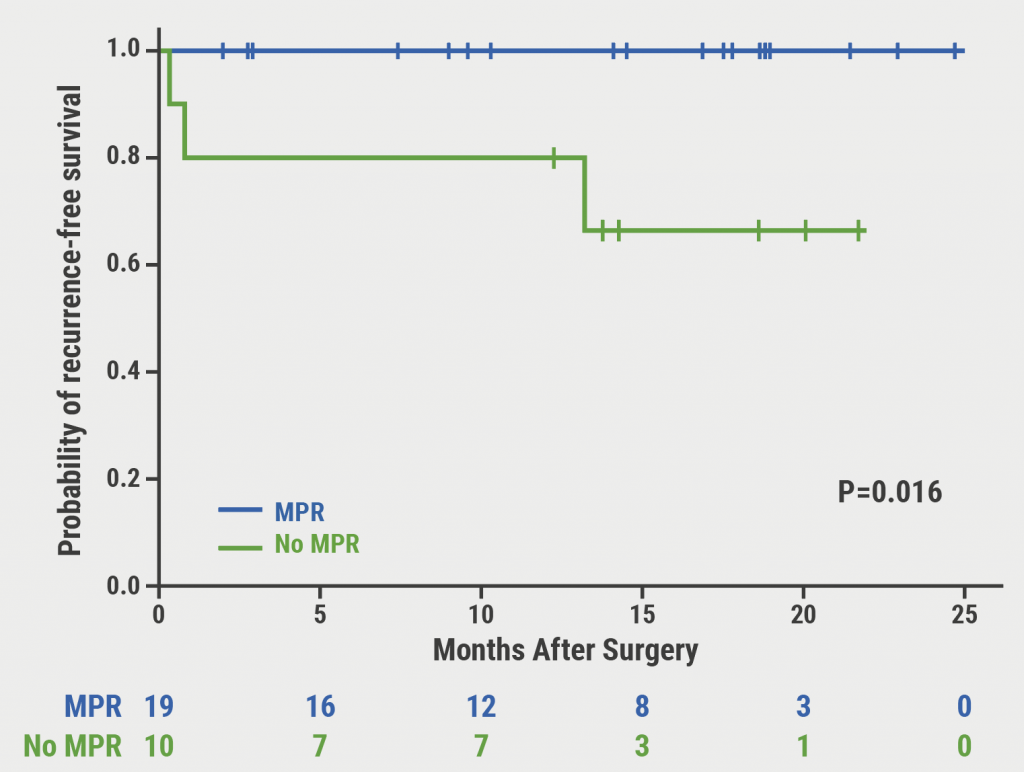EGFR-directed TKIs are the standard of care for patients with EGFR-mutated NSCLC. However, the development of various resistance mechanisms commonly leads to progression. Platinum-based chemotherapy following EGFR TKI failure has limited efficacy. Patritumab deruxtecan (HER3-DXd) is an antibody-drug conjugate consisting of a fully human monoclonal antibody to HER3 – expressed in 83% of NSCLC tumours – attached to a topoisomerase I inhibitor payload via a tetrapeptide-based cleavable linker [1].
Dr Jänne Pasi (Dana Farber Cancer Institute, MA, USA) presented efficacy and safety data from an ongoing phase 1 study (NCT03260491) of HER3-DXd in patients with locally advanced or metastatic EGFR-mutated NSCLC who had failed on prior EGFR TKI therapy [2]. A total of 57 patients were included, who had a median of 4 prior anti-cancer treatments; 100% had prior EGFR TKI, median treatment duration was 5.5 months, and treatment was ongoing in 18 patients (32%). Participants were treated with HER3-DXd 5.6 mg/kg IV every 3 weeks and followed-up for a median of 10.2 months.
At data cut-off, confirmed objective response rate was 39% (n=22: 1 complete responder, 21 partial responders, 19 with stable disease) with 64% of responses occurring within 3 months of starting HER3-DXd. Disease control rate was 72%, median duration of response was 6.9 months, and median progression-free survival was 8.2 months. Anti-tumour activity was observed across diverse mechanisms of EGFR TKI resistance, including those not directly related to HER3 (EGFR C797S, MET or HER2 amp, and BRAF fusion). Among patients with a history of brain metastases and prior platinum-based chemotherapy, objective response rate was 37%.
HER3-DXd had a manageable safety profile and a low rate of discontinuation due to adverse events. The most common grade ≥3 adverse events were thrombocytopenia (30%), neutropenia (19%), and fatigue (14%). Drug-related interstitial lung disease by central adjudication occurred in 4 patients (7%; 1 grade ≥3; no grade 5); 6/57 pts (11%) had adverse events associated with treatment discontinuation (none were due to thrombocytopenia).
- Scharpenseel H, et al. Sci Rep. 2019;9:7406.
- Pasi AJ, et al. Efficacy and safety of patritumab deruxtecan (HER3-DXd) in EGFR inhibitor-resistant, EGFR-mutated (EGFRm) non-small cell lung cancer (NSCLC). Abstract 9007, ASCO 2021 Virtual Meeting, 4–8 June.
Copyright ©2021 Medicom Medical Publishers
Posted on
Previous Article
« Trastuzumab-deruxtecan showed clinical activity in patients with brain metastases Next Article
Benefit of both I-O/chemo combo and I-O/I-O combo over chemotherapy alone in oesophageal squamous cell cancer »
« Trastuzumab-deruxtecan showed clinical activity in patients with brain metastases Next Article
Benefit of both I-O/chemo combo and I-O/I-O combo over chemotherapy alone in oesophageal squamous cell cancer »
Table of Contents: ASCO 2021
Featured articles
Downloadable 1-Page Editor-Selected Trial PowerPoint Slides
Breast Cancer
Excellent prognosis for breast cancer patients with ultra-low-risk gene signature
Olaparib benefits early breast cancer patients with BRCA1/2 germline mutation
Platinum-based adjuvant chemotherapy in TNBC is not superior or non-inferior to capecitabine
Dalpiciclib benefits patients with HR-positive, HER2-negative advanced breast cancer
Trastuzumab-deruxtecan showed clinical activity in patients with brain metastases
Lung Cancer
Neoadjuvant nivolumab plus chemotherapy improves surgical outcomes in NSCLC
Immune-related adverse events are associated with efficacy of atezolizumab in patients with advanced NSCLC
Sustained efficacy of nivolumab/ipilimumab plus 2 cycles of chemotherapy in NSCLC
Patritumab deruxtecan (HER3-DXd) in EGFR TKI-resistant NSCLC
Melanoma
Long-term results from ground-breaking melanoma trials
Novel dual checkpoint blockade improves progression-free survival in melanoma
Neoadjuvant therapy with nivolumab plus relatlimab is safe and effective in patients with stage III melanoma
Genitourinary Cancers
VISION trial shows improved survival with 177Lu-PSMA-617 in mCRPC
Abiraterone added to ADT + docetaxel nearly doubles survival in de novo mCSPC
Post-nephrectomy pembrolizumab improves disease-free survival
Glutaminase inhibitor telaglenastat does not improve survival mRCC
Promising efficacy and safety of feladilimab in recurrent/metastatic urothelial carcinoma
Gastrointestinal Cancers
Pembrolizumab benefits survival in MSI-H/dMMR metastastic colorectal cancer
Panitumumab added to 5-FU/LV effective as maintenance therapy in patients with mCRC
Trastuzumab-deruxtecan showed promising activity in patients with HER2-expressing mCRC
Benefit of both I-O/chemo combo and I-O/I-O combo over chemotherapy alone in oesophageal squamous cell cancer
Benefit of I-O/chemo combo over chemotherapy alone in advanced GC/GEJC/EAC
Perioperative chemotherapy and neoadjuvant multimodality therapy appear equally effective
Haematological Cancers
Olutasidenib demonstrates efficacy in patients with relapsed/refractory IDH1 mutant AML
Acalabrutinib as effective but better tolerated than ibrutinib in CLL
Gynaecological Cancers
Adjuvant chemotherapy does not improve outcome in patients with locally advanced cervical cancer
Novel drug combination for recurrent ovarian cancer
Dual HER2-blockade shows anti-tumour activity in patients with uterine cancer
Paediatric Cancer
Molecular tumour profiling impacts the diagnosis and treatment of solid tumours
Circulating tumour DNA to evaluate response in children with neuroblastoma
Basic Science
PARP7 inhibitor shows promising results in first-in-human trial
IACS-6274 is well tolerated and biologically active in selected advanced tumours
CYT-0851 shows promising anti-tumour activity across different tumour types
Related Articles

August 12, 2021
Novel drug combination for recurrent ovarian cancer
© 2024 Medicom Medical Publishers. All rights reserved. Terms and Conditions | Privacy Policy
HEAD OFFICE
Laarderhoogtweg 25
1101 EB Amsterdam
The Netherlands
T: +31 85 4012 560
E: publishers@medicom-publishers.com

